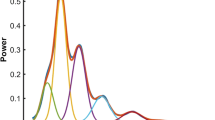Abstract
The present study was designed to explore the relationship between psychological stress and esophageal motility disorders. Nineteen non-cardiac chest pain patients (10 with the nutcracker esophagus and nine with normal baseline manometry) and 20 healthy control subjects were administered two acute stressors: intermittent bursts of white noise and difficult cognitive problems. The results indicated that the esophageal contraction amplitudes and levels of anxiety-related behaviors of non-cardiac chest pain patients and control subjects were significantly greater during the stressors than during baseline periods. All patients demonstrated significantly greater (P<0.01) increases in contraction amplitude and anxiety-related behavior during cognitive problems than during the noise stressor. The nutcracker esophagus patients showed a greater increase in contraction amplitude during the problems (23.50±9.42 mm Hg, ¯X ±SE) than control subjects (P<0.01), while the amplitude changes of chest pain patients with normal baseline manometry were not significantly greater than that of control subjects (9.00±1.91 mm Hg). The present results identified an increase in contraction amplitude as the primary esophageal response to stress. The possible interaction of esophageal contraction abnormalities, psychological stress, and the perception of chest pain is discussed.
Similar content being viewed by others
References
Wolf S, Almy TP: Experimental observations on cardiospasm in man. Gastroenterology 13:401–421, 1949
Rubin J, Nagler R, Spiro HM, Pilot ML: Measuring the effect of emotions on esophageal motility. Psychosom Med 24:170–176, 1962
Stacher G, Schmeierer C, Landgraf M: Tertiary esophageal contractions evoked by acoustic stimuli. Gastroenterology 44:49–54, 1979
Stacher G, Steinringer H, Blau A, Landgraf M: Acoustically evoked esophageal contractions and defense reaction. Psychophysiology 16:234–241, 1979
Young LD, Richter JE, Anderson KO, Bradley LA, Katz PO, McElveen L, Obrecht WF, Dalton C, Snyder RM: The effects of psychological and environmental stressors on peristaltic esophageal contractions in healthy volunteers. Psychophysiology 24:132–141, 1987
Clouse RE, Staiano A: Contraction abnormalities of the esophageal body in patients referred for manometry: A new approach to manometric classification. Dig Dis Sci 28:784–791, 1983
Brand DL, Martin D, Pope CE II: Esophageal manometrics in patients with angina-like chest pain. Am J Dig Dis 23:300–304, 1977
Clouse RE, Lustman PJ: Psychiat ric illnesses and con traction abnormalities of the esophagus. N Engl J Med 309:1337–1342, 1982
Richter JE, Obrecht WF, Bradley LA, Young LD, Anderson KO: Psychological similarities between patients with the nutcracker esophagus and irritable bowel syndrome. Dig Dis Sci 31:131–138, 1986
Epstein SF, Gerber LH, Borer JS: Chest wall syndrome: A common cause of unexplained cardiac pain. JAMA 241:2793–2797, 1979
Benjamin SB, Gerhardt DC, Castell DO: High amplitude, peristaltic esophageal contractions associated with chest pain and/or dysphagia. Gastroenterology 77:478–483, 1979
Richter JE, Wu WC, Johns DN, Blackwell JN, Nelson JL, Castell JA, Castell DO: Esophageal manometry in 95 healthy adult volunteers: Variability of pressures with age and frequency of “abnormal” contractions. Dig Dis Sci 32:583–592, 1987
Bernstein LM, Baker LA: A clinical test for esophagitis. Gastroenterology 34:760–781, 1958
Richter JE, Hackshaw BT, Wu WC, Castell DO: Edrophonium: A useful provocative test for esophageal chest pain. Ann Intern Med 103:14–21, 1985
Richter JE, Barish CF, Castell DO: Abnormal sensory perception in patients with esophageal chest pain. Gastroenterology 91:845–852, 1986
Klein DC, Fencil-Morse E, Seligman MEP: Learned helplessness, depression, and the attribution of failure. J Pers Soc Psychol 33:508–516, 1976
Hiroto DS, Seligman MEP: Generality of learned helplessness in man. J Pers Soc Psychol 31:311–327, 1975
Spielberger CD, Gorsuch RL, Lushene RE: Manual for the State-Trait Anxiety Inventory. Palo Alto, Consulting Psychologists Press, 1970
O'Neil HF, Spielberger CD, Hansen DN: The effects of state anxiety and task difficulty on computer-assisted learning. J Educ Psychol 60:343–350, 1969
Kay RC: Psychological preparation for a potentially stressful medical procedure. Unpublished doctoral dissertation, 1984. Fordham University, Bronx, New York
Kendall PC, Williams L, Pechacek TF, Graham LG, Shisslak CS, Herzoff N: Cognitive-behavioral and patient education interventions in cardiac catheterization procedures: The Palo Alto medical psychology project. J Consult Clin Psychol 47:49–58, 1979
Bernstein DA, Borkovec TD, Coles MGH: Assessment of anxiety.In Handbook of Behavioral Assessment, 2nd ed. AR Ciminero, KS Calhoun, HE Adams (eds). New York, Wiley, 1986, pp 353–403
Bellack AS, Lombardo TW: Measurement of anxiety.In Behavioral Theories and Treatment of Anxiety. SM Turner (ed). New York, Plenum, 1984, pp 51–89
Hays WL: Statistics. New York, Holt, Rinehart, Winston, 1973
Kronecker H, Meltzer SJ: Der Schluck-mechanismus, seine erregung und seine Hemmung. Arch Anat Physiol (Suppl) 7:328–362, 1883
Jacobson E: Spastic esophagus and mucous colitis: etiology and treatment by progressive relaxation. Arch Intern Med 39:433–445, 1927
Faulkner WB Jr: Severe esophageal spasm: an evaluation of suggestion-therapy as determined by means of the esophagoscope. Psychosom Med 2:139–140, 1940
Cohen S: Esophageal motility disorders and their response to calcium channel antagonists. The sphinx revisited. Gastroenterology 93:201–203, 1987
Clouse RE, Staiano A, Landau DW, Schlacter JL: Manometric findings during spontaneous chest pain with presumed esophageal “spasm.” Gastroenterology 85:395–402, 1983
Peters LJ, Maas LC, Petty DA, Dalton CB, Penner D, Wu WC, Castell DO, Richter JE: Spontaneous non-cardiac chest pain; evaluation by 24 hour ambulatory motility and pH monitoring. Gastroenterology 94:878–886, 1988
Keshavarzian A, Iber FL, Ferguson Y: Esophageal manometry and radionuclide emptying in chronic alcoholics. Gastroenterology 92:651–657, 1987
Epstein LH, Abel GG: An analysis of biofeedback training effects for tension headache patients. Behav Ther 8:37–47, 1977
Burish TG: EMG biofeedback in the treatment of stress-related disorders.In Medical Psychology: Contributions to Behavioral Medicine. CK Prokop, LA Bradley (eds). New York, Academic Press, 1981, pp 395–421
Author information
Authors and Affiliations
Additional information
This work was supported by Public Health Services grant AM 34200-01AI from NIADDK.
Rights and permissions
About this article
Cite this article
Anderson, K.O., Dalton, C.B., Bradley, L.A. et al. Stress induces alteration of esophageal pressures in healthy volunteers and non-cardiac chest pain patients. Digest Dis Sci 34, 83–91 (1989). https://doi.org/10.1007/BF01536159
Received:
Revised:
Accepted:
Issue Date:
DOI: https://doi.org/10.1007/BF01536159




